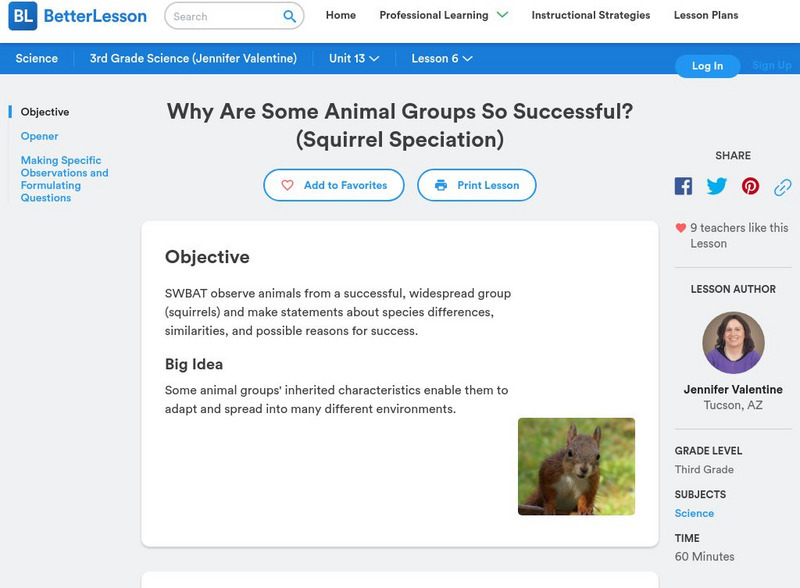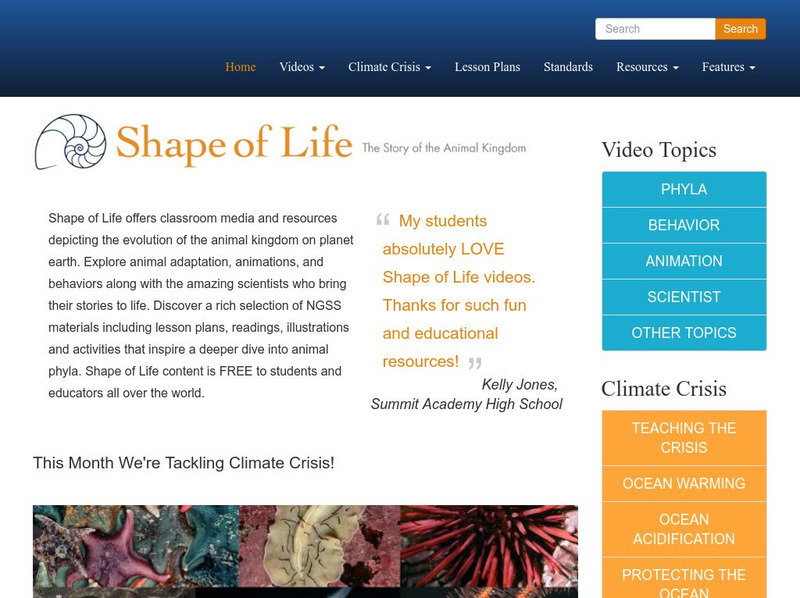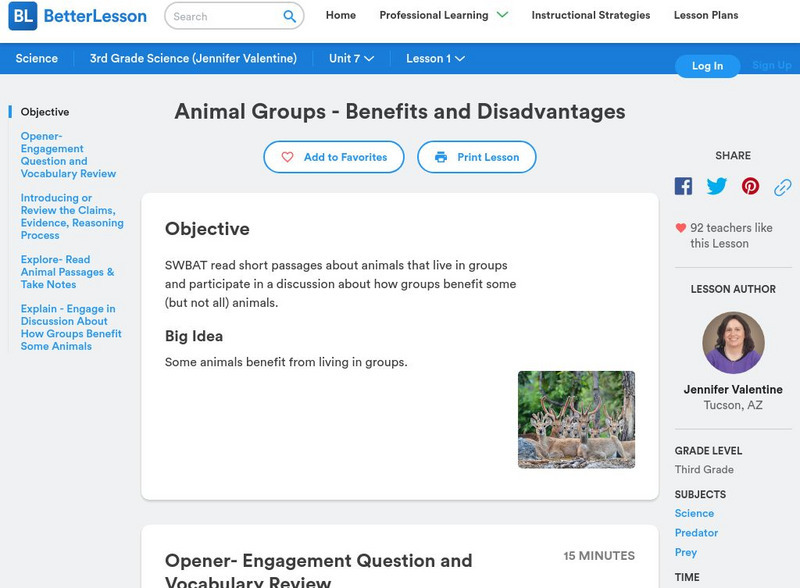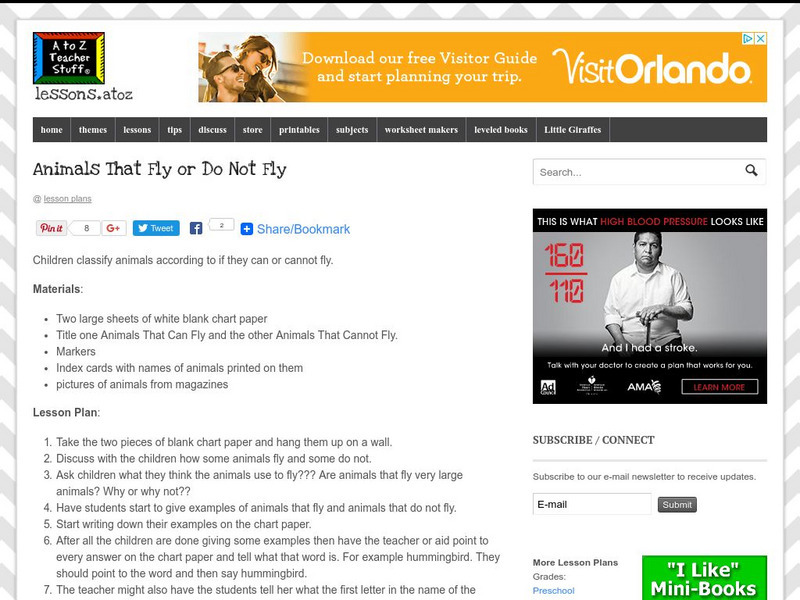Curated OER
Investigating Animals in Water
Students observe small animal activity. They identify local water animals and describe the habitats where water animals can be found. Students collect samples to observe in the classroom.
Curated OER
Territorial Behavior in Dragonflies and Damselflies
Students explore dragonfiles/damselfiles and their behaviors. They examine their differences and their life cycles. Students observe the dragonflies in a field and determine the number of different species.
Curated OER
A World of Feathered Friends
pupils will learn to
respect the nature around them. This respect is vital because ignorance of surrounding
nature can lead to carelessness when curiosity goes awry. A perfect example of this
wayward curiosity took place at our school...
Curated OER
Sharkland Wiki
Students, while researching the waters around southern Africa and viewing a video of the episode "Sharkland" from Thirteen's series NATURE, critique reliability of online resources and analyze the various components of a wiki. They...
Curated OER
Make Sense of Nature
Students participate in this program that heightens their awareness and curiosity of nature as well as their sense of adventure and exploring new surroundings. They identify and choose an object from nature after exploring it with other...
Curated OER
Compost Tag
Students identify biodegradable items. In this environmental instructional activity, students participate in a game of tag. A student's name is called out along with a biodegradable item and the student is tossed a ball.
Better Lesson
Better Lesson: Why Are Some Animal Groups So Successful?
Using squirrels as an example, young scholars will understand that some animal groups' inherited traits enable them to adapt and spread into many environments. Included in this lesson are videos showing the lesson in action, discussion...
A-Z Animals
A Z Animals: Reference: Animal Classification
This entry identifies the defining characteristics of animal classification.
Sea Studios Foundation
Shape of Life: The Story of the Animal Kingdom
Shape of Life is a series of videos which explore the evolution of the animal kingdom. Discover those who study animals and the methods in which these scientists use to learn more about them.
The Wonder of Science
The Wonder of Science: 3 Ls2 1: Animal Groups
Work samples, phenomena, assessment templates, and videos that directly address standard 3-LS2-1: animal groups.
CK-12 Foundation
Ck 12: Episd: Animal Classification
[Free Registration/Login may be required to access all resource tools.] Check out the diverse traits that animals can have that put them into different Phyla to make it easier to classify them.
CK-12 Foundation
Ck 12: Biology: Animal Classification
[Free Registration/Login may be required to access all resource tools.] Overview of classifying animals.
BiologyWise
Biology Wise: Animal Kingdom Classification
Describes the main phyla in the kingdom Animalia.
Other
Pember Museum of Natural History: Animal Classification Tree
A visual showing how the animal kingdom is classified by traits.
Better Lesson
Better Lesson: Animal Groups Benefits and Disadvantages
Third graders read short passages about animals that live in groups and participate in a discussion about how groups benefit some (but not all) animals.
Utah Education Network
Uen: Plant and Animal Communities
Learn about the six main classes of the animal kingdom.
Alabama Learning Exchange
Alex: What's Your Classification?
After completing this activity, the students will understand that scientists group animals into categories. Students will understand that scientists use specific characteristics to group animals. They will also extend their knowledge of...
TED Talks
Ted: Ted Ed: Cannibalism in the Animal Kingdom
Until recently, scientists thought cannibalism was a rare response to starvation or other extreme stress. Well-known cannibals like the praying mantis and black widow were considered bizarre exceptions. But now, we know they more or less...
Yale University
Yale New Haven Teachers Institute: Animal Kingdom
Background information about all of the classes of the animal kingdom, followed by four short lesson plan outlines.
ClassFlow
Class Flow: Animal Classification
[Free Registration/Login Required] This flipchart introduces the five kingdoms of animal classification. It includes Activote questions to assess understanding of the topic.
ClassFlow
Class Flow: Animal Kingdom
[Free Registration/Login Required] This flipchart introduces students to the animal kingdom, differentiating between vertebrates and invertebrates.
Discovery Education
Discovery Education: Animal Classification
Use this lesson plan to help students understand the reasons for classifications and ways that different species are separated.
A to Z Teacher Stuff
Lesson Plan: Classifying Animals
Students classify animals according to whether or not they can fly. The lesson plan includes instructions and materials.
Quia
Quia: Animal Classifications
An interactive matching game from Quia dealing with animal classifications.
Other popular searches
- Plant Animal Classification
- Animal Classification System
- Animal Taxonomy Game
- Animal Classification Test
- Animal Classification Fish
- Animal Classification Units
- Classifying Animals Chart
- Diversity of Animal Kingdom
- Animal Classification Lesson
- Classifying Animal Groups
- 5e Animal Classification
- Science Classifying Animals























